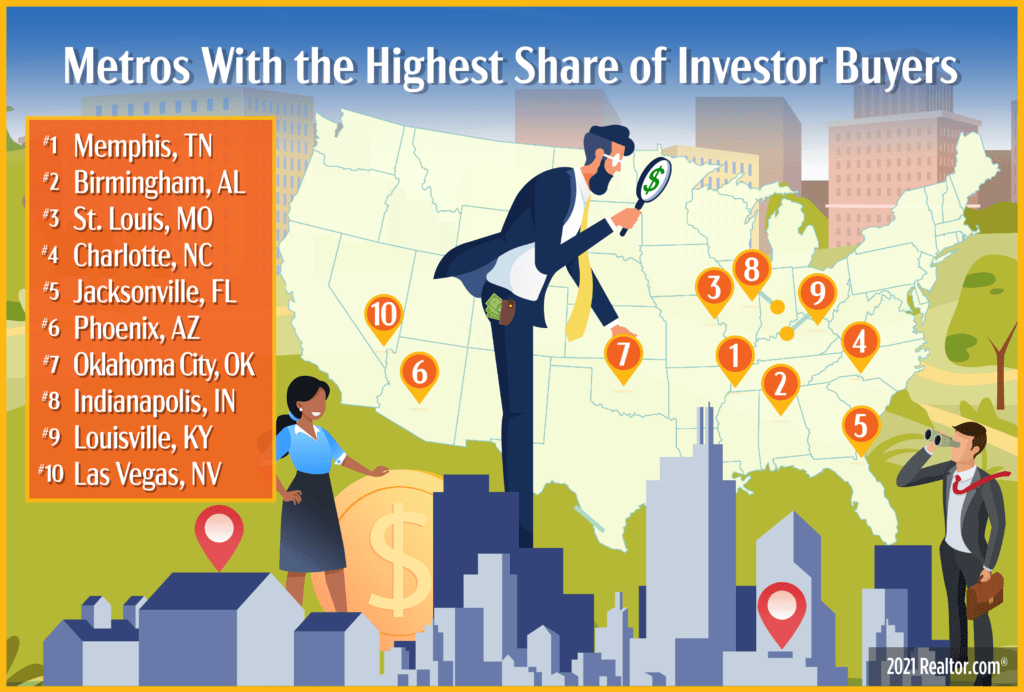Wall Street vs. Main Street: 10 Cities Where First-Time Buyers Are Battling Investors for the Best Homes
December 16, 2021

December 16, 2021

n today’s hot housing market, homebuyers aren’t just attempting to outbid that friendly couple they spotted at the open house admiring the kitchen cabinetry. No, they’re also gearing up to compete with substantially bigger fish: an influx of deep-pocketed real estate investors who are vying for the same modest, single-family homes in the suburbs—and sometimes coming to the party with all-cash offers.
As competitions go, this one isn’t exactly a fair fight.
Real estate investors have been buying up homes at a feverish pace during the COVID-19 pandemic, hoping to cash in on low mortgage rates and skyrocketing rents. They’re flipping single-family homes, townhouses, and condos for a profit or turning them into rentals. The share of investors in the market hit the highest level since at least 2015, according to an analysis of deed records by Realtor.com®.
Furthermore, they’re affecting some markets far more than others. We decided to look at where investors are scooping up the most homes in the U.S. right now.
In these places, the mass of investors is further driving up prices and edging out first-time and other buyers who can’t compete with hefty offers from Wall Street hedge funds, well-to-do mom and pop investors, and real estate investment companies.
“Investors are particularly attracted to affordably priced homes, the very homes that would normally be appealing to first-time buyers,” says Realtor.com Manager of Economic Research George Ratiu. “Investors who generally come with cash have a significant advantage over first-timers who typically rely on a mortgage. In a market with few homes for sale already, this prices out many buyers.
“Homeownership either gets pushed out of reach or delayed for a lot of Americans who can’t compete with investors even though otherwise they would be ready and qualified for it,” adds Ratiu.
https://www.buzzsprout.com/214131/9416913-118-exclusive-tv-ghost-hunters-offer-true-tales-of-scary-encounters?client_source=small_player&iframe=true&referrer=https://www.buzzsprout.com/214131/9416913-118-exclusive-tv-ghost-hunters-offer-true-tales-of-scary-encounters.js?container_id=buzzsprout-player-9416913&player=small
While investors don’t make up a huge portion of the market, they’re growing—particularly in the Midwest and Sun Belt where home prices are still relatively affordable and rental prices are rising. Investors made up 5.5% of all home purchases in the first seven months of 2021.
“Prior to the Great Recession, a lot of investors were in the flipping business. Now you have more professional investors acquiring properties for possible rentals,” says Columbia University real estate professor Tomasz Piskorski. “This makes sense given the expected demand for suburban housing. Not every millennial can afford a down payment, not every millennial wants to be tied down.”
While real estate investors may be the bête noire of frustrated first-time homebuyers, they can actually have an overall positive impact on real estate markets. Flippers tend to buy fixer-uppers and rehab them, and then put them back on the market, which helps update the nation’s aging housing stock. Other investors may sell the homes they’re renting out, adding much-needed inventory to the market.
To determine where investors are purchasing the highest share of homes, the Realtor.com data team pored over thousands of deed records in the country’s 50 largest metropolitan areas in July, the latest data available. We looked at any type of home (single-family, condos, and townhouses) that was bought by an absentee owner and had a buyer’s name that included some variation of LLP, LP, LLC, GP, or Trust. That usually means the buyer is a large firm such as American Homes 4 Rent, a California company that owns thousands of homes in nearly two dozen states.
Because of this, individual investors (e.g., many mom and pops purchasing a unit here and there to rent out or put on Airbnb) were not included in the analysis. (About 41% of rental units were owned by individual investors, according to census estimates.) For geographic diversity, we limited this list to one metro per state.


Share of investor buyers in July: 17%
Median list price in September: $249,000
Median rent in September: $1,217
Investors have long been scooping up homes in the Memphis metro area, lured by the cheap housing stock and the large population of renters. Home prices here are significantly lower than in other nearby metros such as Nashville, where the median list price was $448,000.
Investment companies have scooped up thousands of homes and turned them into rental properties in the past two years alone, according to an analysis of Shelby County property records by local news station ABC 24 News. Just over half of the residents here were renters from 2015 through 2019, according to census data.
Rising prices and the competition from investors are making it harder for some local buyers to achieve homeownership. Median list prices rose nearly 6.2% from September 2019, before the pandemic began, to September 2021, according to the most recent Realtor.com data.
Investors can purchase a home and then rent it out for about 1% of its value each month, says real estate agent Pablo Pereyra, of 901 Realtors.
“It’s been challenging for local homebuyers,” he says. “Now the people who live here are having to compete with investors from out of town.”
Share of investor buyers: 16%
Median list price: $271,000
Median rent: $1,115
Many of the larger investment firms in the Birmingham area are not only offering over the list price in cash and waiving appraisals and contingencies—some are even paying the sellers’ closing costs, says real estate agent Marcus Brown, of Barnes & Associates.
“It’s difficult for a buyer to compete with an offer like that, especially a first-time buyer,” says Brown. “It’s frustrating for them.”
Birmingham is appealing to investors because of its lower price point and for having the second-lowest property tax rate in the country, according to the personal finance website WalletHub. That makes an investor’s ROI even better.
Birmingham, Alabama’s second-most populous city, is a thriving metro with art museums, outdoor activities, and a big population of college students who all need places to live.
Eagle-eyed investors and first-time buyers can find a great deal on homes that need a little bit of work. Neighborhoods such as Huffman and nearby towns Pleasant Grove and McCalla are lower-priced communities that investors have been purchasing in.

Share of investor buyers: 14%
Median list price: $250,000
Median rent: $1,150
Over the past few years, many larger, institutional investors have moved into the St. Louis region. They’re often snapping up move-in ready, single-family homes they can rent out over the long term.
That’s leading many first-time buyers to lose out on bidding wars—particularly in cheaper, northern St. Louis County.
Most of the homes on the market aren’t quite fixer-uppers—they’re just a bit outdated, says Dennis Norman, president of MORE Realtors in St. Louis. He works with homebuyers as well as investors and has flipped more than 2,000 homes over his career.
“There are many very large, strong financial organizations that are buying single-family properties all over St. Louis, most of them for rentals,” he says. “And they’re buying in the lower price ranges up to the middle price ranges. That’s putting homebuyers in those price ranges in direct competition.”
Share of investor buyers: 13%
Median list price: $390,000
Median rent: $1,543
This financial hub has experienced explosive job growth over the past few years. Trendy restaurants and good schools appeal to millennials and young families, while warm weather and a reasonable cost of living make it a popular destination for retirees seeking access to both the beach and the mountains.
This steady stream of people and relatively inexpensive housing stock make the Charlotte area attractive to both everyday buyers and investors. Within Mecklenburg County, institutional investors own nearly 11,500 single-family homes, according to a recent report from the University of North Carolina at Charlotte.
According to the analysis, most purchases have been of starter homes in midpriced, family-friendly neighborhoods like Steele Creek. A three-bedroom ranch home there was just listed for under $320,000.

Share of investor buyers: 13%
Median list price: $370,000
Median rent: $1,446
Investment companies have been purchasing thousands of homes in Jacksonville lately and turning them into rental properties, according to an investigation by local news station Action News Jax.
Out of the county’s more than 250,000 homes, nearly a quarter of them are owned by investors, the Duval County property appraiser told the station. That means buyers without deep pockets in the area are facing some stiff competition.
Lower-priced homes are the major draw, as residences in Jacksonville are a little more affordable than nearby Tampa or Orlando. The median prices in those metros are about $360,000 and $375,000 respectively.
“You can find a house for $60,000, put $20,000 into it, and then it’s worth $110,000,” says Ernest Jenkins, a real estate investment adviser who grew up in the area. “You don’t find returns like that in other big metro areas.”
Share of investor buyers: 12%
Median list price: $475,000
Median rent: $1,700
Phoenix has long been a hot spot for investors looking to capitalize on a steady surge in new residents.
Lately local real estate broker Michelle Shelton is “constantly” seeing the regular buyers lose to investors. Many of them are so discouraged that they’re giving up—at least temporarily.
“We’re taking the American dream of homeownership away by allowing the investors to dominate,” says Shelton, of Life Real Estate in the Phoenix area. “If you have five people who want to buy the home and you have this investor coming with $5,000 more in cash without the drama, they’re the clear winners. Most sellers want to get the maximum amount with the least amount of hassle. The investors know this, and that’s what they’re offering.”

Share of investor buyers: 11%
Median list price: $277,000
Median rent: $850
Even with all of the new, more affordably priced homes that have been going up in Oklahoma City, there still isn’t enough housing to go around. Oklahoma City’s population has surged more than 17% over the past decade, according to the U.S. Census Bureau. That’s left buyers scrambling for whatever comes onto the market.
“There are a lot of investors coming in from the coasts. We see a lot of people from New York, California, and they’re buying everything,” says local real estate agent Teresa Ballenger, at eXp Realty.
She has one client who has lost out on 14 bidding wars, some of which were won by investors.
“First-time buyers are really suffering right now,” says Ballenger. “Loans can’t compete with the cash investors who can close in two weeks.”
Share of investor buyers: 10%
Median list price: $280,000
Median rent: $1,168
Indiana’s capital is another affordable place for cash-strapped buyers and investors to build their portfolios. Out-of-state investors have been focusing on Indianapolis for at least the past year as they’ve been priced out of more expensive parts of the country.
Homes here are significantly less than the national median, and the potential for returns is high. And with a median rent of $1,168 per month, up 13% from the year before, investors can have a steady stream of passive income.
“Even without a competing cash offer, buyers with low down payments and the inability to offer appraisal gap waivers are having a hard time,” says Kristie Smith, a Realtor® with the Indy Homes Team. They’re competing not just with investors, but also other buyers with more money and better credit.

Share of investor buyers: 10%
Median list price: $250,000
Median rent: $1,035
Louisville is one of the fastest-growing cities in the state, according to the Kentucky League of Cities. It’s expected to grow more as the city has announced billions of dollars in new development since 2014. All those people coming in will need places to live—pitting homebuyers against investors.
Top employers in the area include UPS, which has a major hub in Louisville, two Ford Motor plants, and health insurance company Humana, headquartered here. About 40% of the city is made up of renters, according to the website RENTCafe,
Buyers and investors can find many fixer-uppers—if they’re willing to contribute some elbow grease. This two-bedroom, one-bathroom house for $69,900 is marketed as an “investor special” as it’s in need of serious work.
Share of investor buyers: 10%
Median list price: $430,000
Median rent: $1,548
Vegas was one of the hardest-hit cities when the housing bubble burst more than a decade ago, but home prices have rebounded significantly since then. Now investors are back on the prowl for homes, something that makes longtime real estate professionals in the area take pause.
Bryan Kyle, a real estate agent and property manager at First Serve Realty in Las Vegas, says he sold several homes to large, real estate investment firms over the past few months. Unlike before the recession, when investors tried to get the best deals, buyers these days are paying up for homes they’ve never seen.
“They used to try to come in lower and negotiate, now they just buy the homes as is and they’re paying top dollar,” Kyle says.
Stay up to date on the latest real estate trends.

May 7, 2025
A flourishing backyard doesn't have to come at the expense of your health – or the planet's

May 6, 2025
Locals know it’s not always sunny in San Diego — especially in May and June.

May 5, 2025
Avoid feeling overwhelmed during your big move—use this realtor-curated checklist to keep track of moving day to-dos.

May 2, 2025
A few tweaks to your cleaning routine can go a long way toward keeping your home fresher, healthier, and more comfortable all spring long.

April 30, 2025
San Diego home buyers have noticed a cool down in the market.

April 29, 2025
San Diego is releasing a new batch of trash and recycling bins equipped with RFID (radio frequency identification) tags as part of its shift to a fee-based trash picku… Read more
You’ve got questions and we can’t wait to answer them.